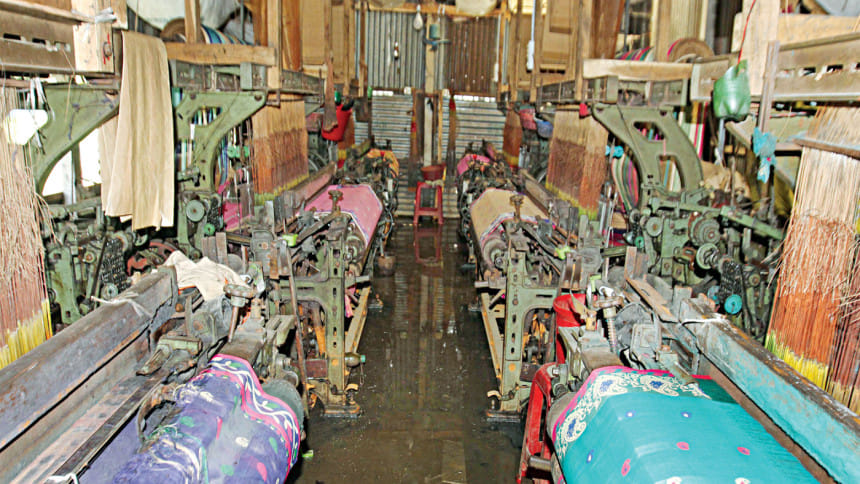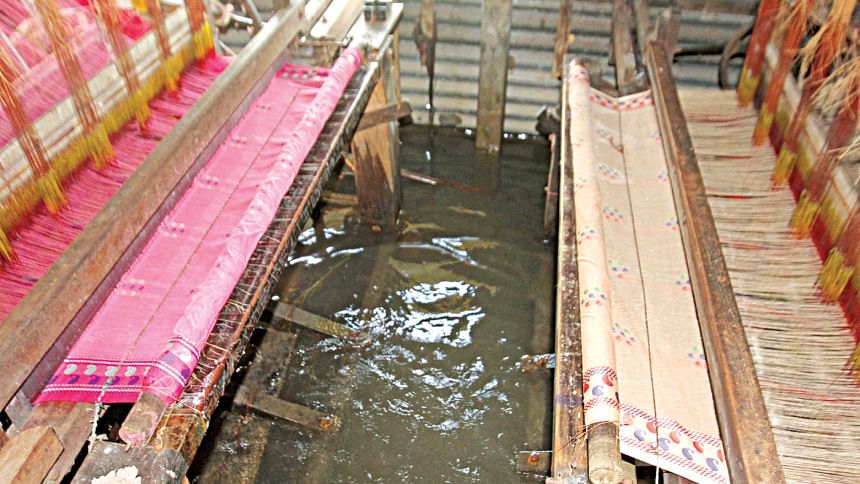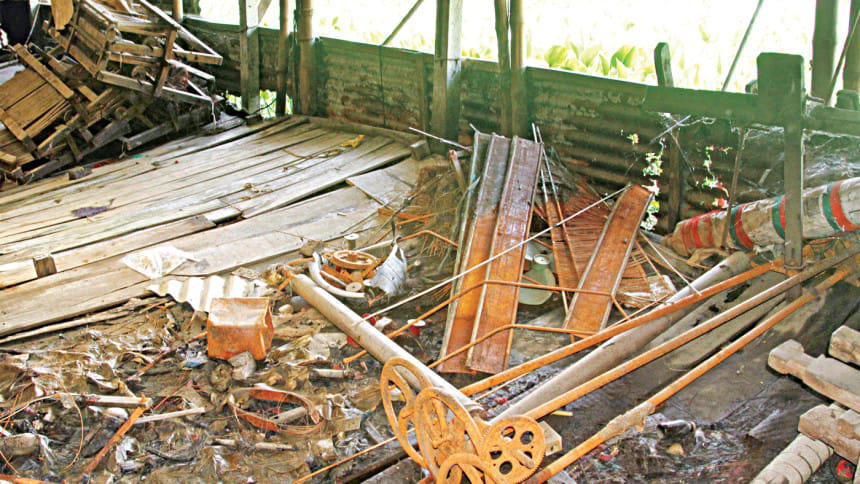Weavers in Tangail struck down by pandemic and flood

Jony Miah's factory of 48 power looms at Singair Mondhyopara village in Kalihati upazila has remained shut since 26 March, when the government directed a general shutdown to curb the spread of the novel coronavirus.
That day the factory's 37 workers left for their homes in the area and nearby districts.
"I can't explain how I have been passing my days for the last five months without any income. On top of that, I have loans."

The looms and raw materials of Miah's factory have been getting damaged one after another for lying unused for so long.
To compound matters, floodwaters have entered the factory and caused more damage.
"I cannot make out how I will survive," said a disconsolate Miah.
Like Miah, hundreds of weavers running small and large handloom and power loom units around the district are going through the same struggle.
There are about 25,500 handlooms registered under Bangladesh Handloom Board (BHB) in the district's 12 upazilas. Another 25,000 power looms are affiliated with the Ministry of Textiles and Jute.
Some 15 lakh workers are engaged in the handloom and power loom factories. About half of them are locals while the rest from districts including Sirajganj, Pabna, Kurigram and Rangpur. They fear that they along with the industry would not be able to make a turnaround without immediate government assistance.

BHB in Tangail has two basic centres, which work on the development and progress of the traditional handloom industry in the district.
One at Balla in Kalihati upazila caters to Ghatail, Madhupur, Dhanbari, Gopalpur, Bhuapur and Kalihati upazilas, while the other at Bajitpur in Sadar upazila focuses on Delduar, Basail, Mirzapur, Nagarpur, Sakhipur and Sadar upazilas.
The two centres have registered 49 Primary Weavers Associations (Prathomik Tanti Samity) and four Secondary Weavers Associations (Madhyomik Tanti Samity).
Of the 27,931 handlooms of 4,391 factory owners under the two associations, 2,673 handlooms had gone out of operation in the past two years, said officials of the centres.
Those that had continued running shut operations abiding by the 26 March government directive.
Since then, the handloom industry in Tangail had been incurring loses of about Tk 1.88 crore per day on an average, they said.
Giving a breakdown, the officials said the Bajitpur centre was working with 12,429 handlooms of 2,267 owners under 32 Primary Weavers Associations and three Secondary Weavers Associations.
Of those, 2,673 handlooms had gone out of operation while 9,756 handlooms continued running in the past two years.
The centre mainly deals with traditional saris made out of thin yarn using handlooms. Its assessment of losses per day was Tk 78.5 lakh, meaning Tk 800 per loom on an average.
In the case of the Balla centre, it was working with 18,175 handlooms of 2,124 owners under 17 Primary Weavers Associations and one Secondary Weavers Associations.
Their saris were made of thick yarn using handlooms. Their daily loss assessment was Tk 1.9 crore, translating to Tk 600 on an average per handloom.
From the last week of March to the first week of August, about Tk 250 crore was lost by the traditional weaving industry of the district.
Moreover, recent prolonged floods hit the industry in many areas, damaging equipment and raw materials mostly in Kalihati upazila.
New areas in the southern region have been inundated, while the flood situation remains unchanged in the northern part of the country and some other districts.
Most of the major rivers in the southern region were overflowing and many of them crossed the danger level.
The forecast is also not good.
However, the authorities are yet to issue their assessment of the flood-induced loses.
The correspondent spoke with several factory owners, workers, officials of the basic centres and those concerned with the industries.
All apprehended a threat to the existence of the traditional weaving industry in the district for the pandemic and the crisis deepened with the recent floods.

Big festivals such as the two annual Eids, Pahela Boishakh and Durga Puja are the main seasons when saris produced by the Tangail weavers are sold.
But this year the festivals' potentials could not be harvested for the pandemic and several lakh saris produced focusing the festivals have remained unsold.
Consequently, many of the skilled workers of the industry are leaving their ancestral profession for other occupations.
The pandemic left many weavers in the area with losses while numerous workers of the industry are now living hand to mouth, said Mofakhharul Islam, president of Balla handloom owners' association.
"There is no option other than immediate government support for saving the industry from destruction."
The workers need financial support to make it through while the factory owners need large amounts of bank loans either interest-free or at low interest to restart their operations, he added.
The local weavers do urgently need support, said Md Imranul Haque, liaison officer (acting) of the Balla centre.
Before the pandemic hit, the centre was providing loans of Tk 2.5 lakh to Tk 3 lakh to the local weavers with a 5 per cent service charge as working capital.
"We have also prepared lists of weavers affected by the pandemic and sent it to the head office, local upazila nirbahi officers and deputy commissioner," he said.
Necessary assistance will be provided to the affected weavers as per directives of the higher authorities, he added.
There has been dead silence prevailing in the weavers' villages for the past five months, said Raghunath Basak, president of Tangail Sari Traders Association.
He emphasised on other initiatives such as the creation of new markets for saris and a stop to import of saris from abroad.
Loans cannot be the only solution for the prevailing crisis in the sector, said Md Rabiul Islam, liaison officer of the Bajitpur centre.
"They produce saris after taking a loan but where will they sell them? Now many women do not wear saris due to changing tastes and lifestyles."
So, the local weavers will have to go for diversification in such times. Besides saris, they will have to produce other attires following current trends, Islam added.

 For all latest news, follow The Daily Star's Google News channel.
For all latest news, follow The Daily Star's Google News channel. 



Comments